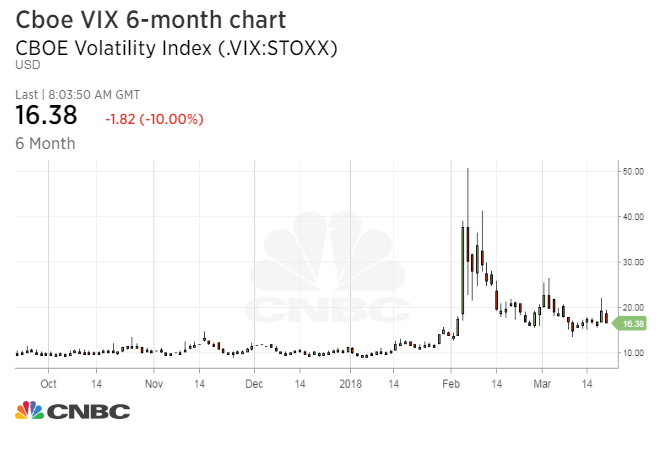A slowdown in VIX futures trading will weigh on shares of Cboe Global Markets, J.P. Morgan warned clients Wednesday as it downgraded shares of the international exchange operator.
"We see continued risk of a further slowdown in VIX Futures activity and see the potential for VIX options trading activity to slow as well as short volatility activity falling from more elevated levels," analyst Kenneth Worthington wrote to clients. "Short volatility strategies had grown to a meaningful part of both exchange-traded product and non-exchange-traded product exposure for asset manager and dealer participants."
In downgrading the company to underweight, Worthington said that VIX volume levels in March have averaged 340,000 per day, the lowest level since January 2017 despite index's 16 percent gain over the year.

The analyst also cut his 12-month price target on Cboe to $106 from $108, implying more than 11 percent downside. Shares of Cboe fell 2.5 percent following J.P. Morgan's second downgrade in two months.
"The report doesn't seem consistent with our current VIX and SPX volumes, which we look at in tandem, including Monday's exceptionally strong volume of 428, 000 VIX futures contracts," Cboe Global Markets President Chris Concannon told CNBC. "Thus far in March, we've seen average daily volume of 1.4 million contracts in SPX options and over 800,000 contracts for VIX options. The data continues to support the utility of SPX and VIX options and VIX futures in varying market conditions."
The rating cut comes a month after inflation fears caused a spike in volatility, sending the Cboe Volatility index (VIX) -- the market's best gauge of fear -- soaring to highs over 50 from lows around 15 in the span of just two days.
The rapid acceleration in volatility was exacerbated by traders who had effectively sold short the VIX (or had purchased inverse VIX exchange-traded products) and were forced to cover their losses.
Goldman Sachs, which downgraded shares of Cboe to neutral immediately after the spike in volatility, noted that VIX futures represented approximately 12 percent of Cboe's 2017 revenue and 40 percent of its sales growth from 2015 to 2017.



